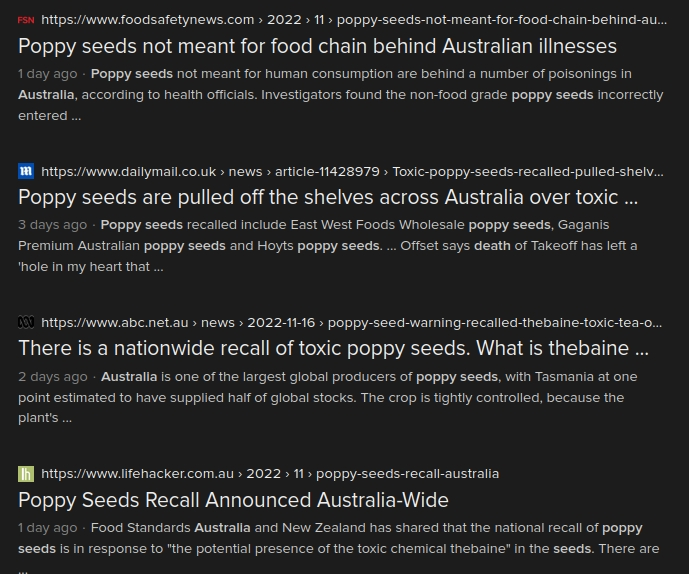If you are using supplements to hopefully manage your CLL, here is an example of why what's natural can make you very ill and why you need to ensure that you obtain your supplements from a reputable source. Along with their use in foods and drinks, poppy seeds are the source of medically important chemicals, but the variety very importantly determines the concentration of these chemicals - and the difference between a pleasant drink or addition to a meal and an emergency admission to hospital and possibly death.
A nationwide recall of poppy seeds has been announced after a spate of poisonings across the country.
Non-food-grade poppy seeds, containing high amounts of the controlled drug thebaine, have since been discovered in the food supply chain. Here's the situation as it stands.
:
Australia is one of the largest global producers of poppy seeds, with Tasmania at one point estimated to have supplied half of global stocks.
The crop is tightly controlled, because the plant's capsules can be deadly if ingested. Overdoses from drinking poppy have been fatal.
From There is a nationwide recall of toxic poppy seeds. What is thebaine? And how do you get sick from poppy seeds?
abc.net.au/news/2022-11-16/...
More information from this The Conversation article:-
theconversation.com/toxic-p...
Poppy seeds come from the poppy plant Papaver somniferum. This plant produces a number of chemicals called alkaloids. Some, like morphine and codeine, have been used medicinally for thousands of years to treat pain and other conditions.
Other naturally occurring poppy alkaloids – such as thebaine, noscapine, laudanosine and papaverine – are less-well described in terms of their effects on humans, but they can have a wide range of toxic effects.
Different varieties of poppy plants contain different amounts of these alkaloids.
Some have very low amounts, which tend to be used to produce food-grade poppy seeds. Varieties with higher amounts are used to produce medicines, such as morphine and codeine.
What happened recently then?
The non-food grade poppy seeds that incorrectly entered the human food supply contain high amounts of the alkaloid thebaine.
Thebaine has very different effects to morphine. In large doses it causes severe and prolonged muscle cramps, spasms, seizures and cardiac arrests, as seen in the recent cluster of poisonings.
High concentrations of thebaine have been identified in the blood of affected people in this latest cluster.
To our knowledge, this is the first time that thebaine has entered the food chain in Australia. However, there are a couple of reports of people who have had severe toxicity after consuming non-food grade poppy seeds in recent decades.
How many poppy seeds are we talking about?
All reported cases in the current cluster at the time of the recall occurred after people consumed poppy seeds as part of a drink – similar to a brewed tea.
Most people had consumed more than 100g poppy seeds (about 11 tablespoons). Although, 50g (5-6 tablespoons) may be sufficient to cause poisoning. Thebaine can build up in the body if you ingest it several times over the same day.
Also keep in mind that the quantities recommended for a medicinal effect against cancer can be much higher than that recommended for more typical uses, so ingredient or contaminant exposure will also be much higher.
Neil
